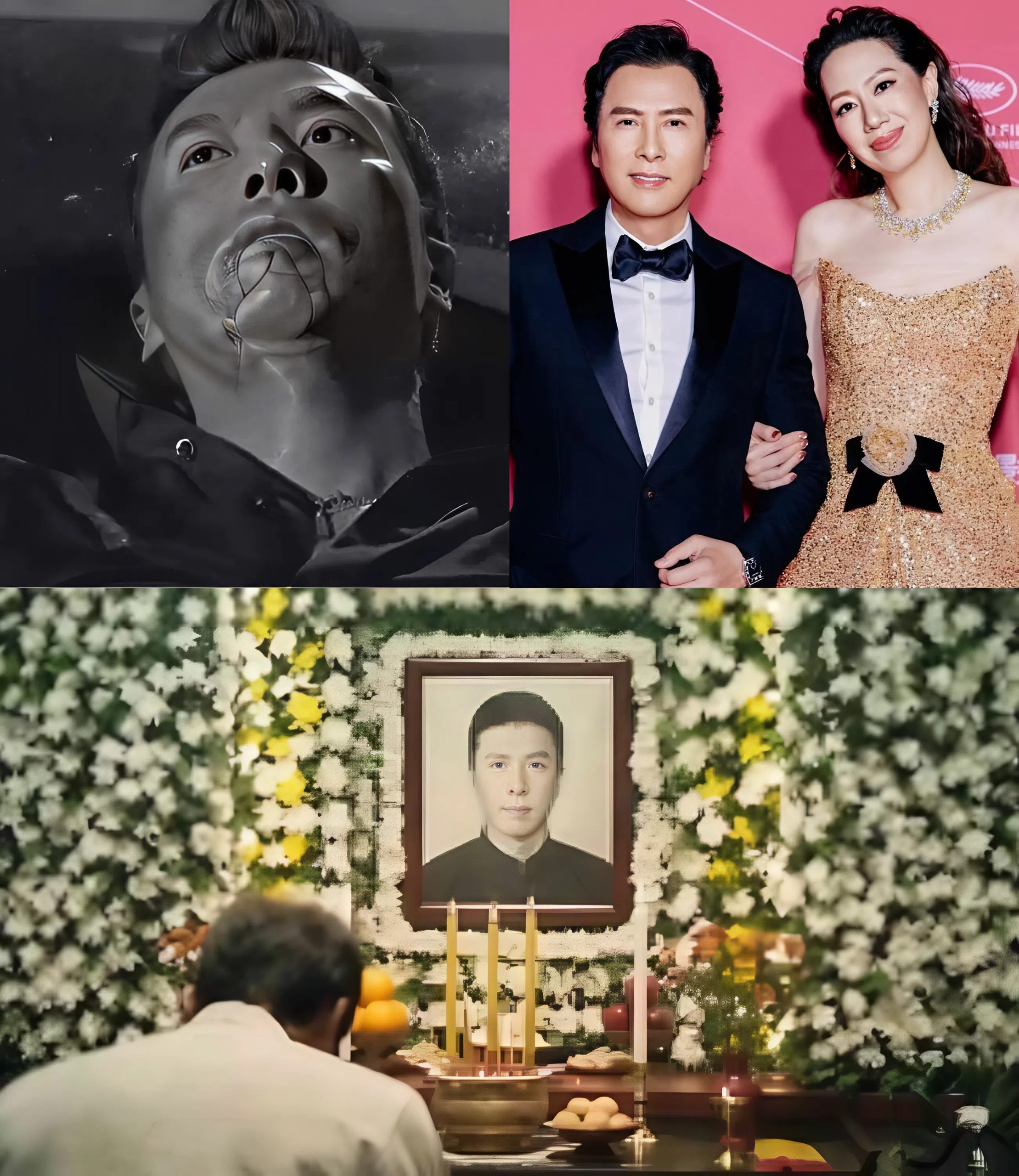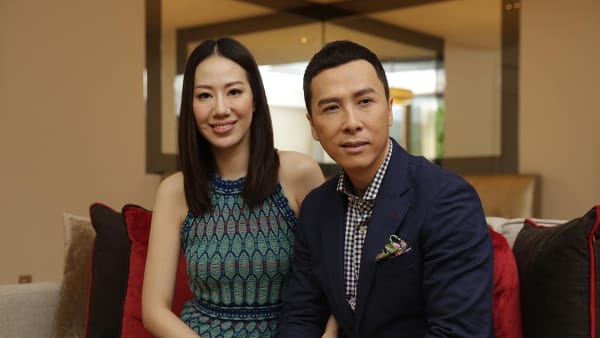A Shocking Silence Falls Over Hong Kong
Forty-nine minutes ago, Hong Kong’s bustling cityscape fell into a stunned hush. The kind of silence that follows tragedy, when words lose their power and even the brightest lights seem dimmed. Donnie Yen, the man who embodied courage and discipline on the silver screen, was suddenly at the center of devastating news. His wife, visibly broken and surrounded by family, confirmed in a trembling voice that her husband had been involved in a catastrophic car accident.
She spoke only a few words—fragmented, heavy with grief: “My husband… was in a terrible accident. Please give us space.” Yet those words struck like thunder across Asia and beyond. What exactly happened in those critical moments on the winding roads near Victoria Peak remains unclear. What is clear, however, is that a beloved figure—a cultural warrior—was fighting his greatest battle.

The Crash That Shook a Nation
Details are still emerging. Police confirmed that Donnie Yen’s car collided with a roadside barrier late in the evening. The stretch of road where it occurred is infamous among locals for its sharp turns and blind corners, a treacherous path even for experienced drivers. Eyewitnesses described hearing a deafening screech followed by a crash that echoed through the hillside.
Emergency responders arrived within minutes. Paramedics fought frantically to stabilize the actor, who was reportedly unconscious when pulled from the wreckage. “I couldn’t believe what I saw,” one bystander told reporters. “Donnie Yen… lying there. This man was always invincible in my eyes.”
The actor was rushed to a central hospital under heavy escort. His condition remains uncertain, and the absence of official medical updates has fueled a tidal wave of speculation.
A Family’s Worst Nightmare
For all his fame, Donnie Yen has always emphasized one truth: family comes first. His wife, Cissy Wang, often stood beside him on red carpets, charity events, and quiet family moments captured by fans. Their marriage, known for its loyalty and strength, had long been a rare beacon of stability in the chaotic world of entertainment.
Tonight, that stability cracked. Reporters described Cissy as pale, her hands trembling as she spoke outside the hospital. Beside her, the couple’s children clutched one another, bewildered and afraid. It was not the image of glamour or celebrity—it was the raw, unfiltered picture of a family staring into the abyss of uncertainty.
Her statement was brief, but her eyes said more: despair, disbelief, and a kind of pain no fame or fortune can shield against.

The Media Frenzy
Within moments, the story leapt from local outlets to global headlines. Hong Kong newspapers issued breaking alerts; international wires carried the news across time zones. Major broadcasters interrupted programming with urgent updates. Social media detonated, hashtags like #PrayForDonnieYen and #StayStrongDonnie trending within minutes.
In the absence of hard facts, the digital world filled the vacuum with rumor. Was it reckless driving? Mechanical failure? A second vehicle involved? Some even whispered of darker possibilities—sabotage, foul play, or an orchestrated “accident.” In an era where conspiracy theories thrive, tragedy becomes not just heartbreak, but also spectacle.
But beyond speculation, one truth united everyone: grief. For millions who grew up watching his films, Donnie Yen was not just an actor—he was a living embodiment of strength. To see him vulnerable, broken, fighting for his life, is a collective wound.
The Weight of a Legend
Why does Donnie Yen’s accident cut so deeply? Because his story has always been larger than life. Born in Guangzhou, raised partly in Boston, and trained under his mother—a martial arts master—Donnie carved a path that merged East and West. His discipline was legendary, his body a canvas of movement, his performances blending artistry and violence with elegance few could match.
He was more than a film star; he was the face of Hong Kong cinema’s survival in a globalized industry. In films like Ip Man, he portrayed not just fighters, but philosophers of discipline, justice, and humility. His fight scenes were symphonies of controlled chaos, admired even by peers like Jackie Chan and Jet Li.
Yet offscreen, Donnie Yen was disarmingly human. He spoke often of his devotion to his wife and children, his gratitude for his mother’s teachings, and his desire to leave behind not just films, but values. His accident feels like more than a personal tragedy—it feels like a wound to an entire cultural tradition.

Colleagues in Mourning
Reactions from industry peers underscored the magnitude of the loss. Jackie Chan reportedly broke into tears upon hearing the news, describing Yen as “a brother who carried the spirit of our art into the next century.” Jet Li wrote simply: “Please fight one more time, Donnie. We are with you.”
Directors who worked with him recalled his meticulous discipline. “He never treated a fight scene as choreography,” one director told South China Morning Post. “He treated it as storytelling. Every punch, every kick, carried meaning. That’s what made him extraordinary.”
Even Hollywood figures chimed in. Vin Diesel, who starred with Yen in xXx: Return of Xander Cage, posted on Instagram: “One of the strongest souls I’ve ever known. My brother, hold on.”
Fans: Grief Without Borders
Across Hong Kong, impromptu vigils began forming—candles, flowers, handwritten notes left at cinema entrances. In mainland China, martial arts schools paused training for moments of silence. Across the Pacific, fans in Los Angeles, London, and Tokyo flooded online spaces with clips of Donnie Yen’s most iconic scenes, celebrating not just the fighter, but the man who gave them hope.
One viral post read: “He taught us that real strength is discipline, not rage. Tonight, we give that strength back to him.”
For many, Donnie Yen’s accident wasn’t just a celebrity story—it was personal. His films had shaped childhoods, inspired martial arts journeys, and instilled values of perseverance. His sudden vulnerability was a cruel reminder of how fragile even our strongest heroes truly are.
The Psychology of Sudden Tragedy
Part of the shock lies in contrast. Just weeks ago, Donnie Yen was photographed smiling with his family, speaking of future projects, even hinting at retirement plans to spend more time at home. He told one interviewer: “I don’t need to prove myself anymore. My greatest role now is being a husband and father.”

To move from that picture of serenity to tonight’s devastation in mere days is almost incomprehensible. Psychologists note that such abrupt shifts amplify grief—because the brain struggles to reconcile how quickly joy can turn to sorrow.
This isn’t just Donnie Yen’s fight—it’s a fight his fans now share, suspended between hope and despair.
The Larger Meaning for Hong Kong Cinema
Hong Kong has long prided itself on producing warriors of the silver screen—Bruce Lee, Jackie Chan, Jet Li. Donnie Yen was their successor, the torchbearer of a tradition that shaped global culture. His accident arrives at a fragile moment for the city, whose film industry has struggled in recent years against Hollywood dominance and local political turbulence.
To lose Donnie Yen—or even to face the possibility—feels symbolic. As though the city itself, already battered, is now being tested again. His recovery, if it comes, will not just be personal—it will be cultural, a rallying point for a city desperate for hope.
Waiting in the Dark
As of this writing, hospital officials remain silent. Donnie Yen’s condition is unknown. Outside the hospital, hundreds of fans gather quietly, holding candles, praying in unison. Inside, a family braces for the worst while clinging to the possibility of a miracle.
His wife’s plea for privacy echoes in the air, but in truth, her grief has already become public. The world now shares her burden, waiting together, breath held, hearts heavy.
Conclusion: The Warrior’s Greatest Battle
Tonight, the man who brought courage to millions lies vulnerable, perhaps fighting for his life. The irony is bitter: Donnie Yen, who embodied strength and invincibility, is now a reminder that even legends bleed, even heroes fall.
Yet perhaps his greatest lesson was never about winning fights on screen. It was about resilience. He once said: “A true warrior is not one who never falls, but one who rises every time he does.”
Now, as millions hold vigil, those words ring truer than ever. Donnie Yen has fallen—but the world prays he will rise once more.